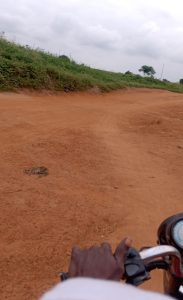Samuel Abel, a farmer woke with a sense of urgency on a steamy morning in Irepodun. He had ten kegs of freshly pressed palm oil ready to be delivered to Osogbo on its market day.
For weeks, the young farmer claimed he had been looking forward to the day the sale of his palm oil would bring in much-needed cash to sustain his family. As the sun ascended, he waited for the familiar rumble of the bus that usually picks his goods. But as hours passed, his hope began to wane.
The road leading to his village had become impassable after days of heavy rain, and no bus dared to navigate the treacherous path. “The road is affecting us in so many ways, especially during the rainy season,” Mr Samuel said, while reflecting on his frustration.
Desperate to consider alternative options. Mr Samuel thought of using a motorcycle, but the weight of 10 kegs is much for a bike to handle in one trip. And the cost of multiple trips would eat into his profits, leaving him with almost nothing. By midday, it was clear that he would not be able to transport his goods to the market. His heart sank as he realized that the fruits of his labor would go unsold, left to sit and spoil in the unforgiving heat.
“When it rains, it becomes nearly impossible to pass, even with a bike. Taking our commodities to the market is very difficult, and we end up spending extra money just to find transportation.”
Decade of Broken Promises
Situated in Osun State, Irepodun is a small town that serves as a symbol of the ongoing disregard for vital infrastructure, such as roads, that many rural communities in Nigeria endure.
Residents of Irepodun have struggled with deteriorating roads for more than ten years. Since former Governor Olagunsoye Oyinlola’s term ended in 2010, there has not been any major maintenance or upgrades.
Even though the community has consistently voted for different administrations, promises made regarding improvements and repairs to the roads have mostly not materialized.
Under Governor Oyinlola’s administration, Irepodun saw its last major roadwork, with some efforts made to upgrade the town’s infrastructure as part of larger state-wide development initiatives.
But after those projects were finished, the town’s roads progressively deteriorated because subsequent administrations did not make the necessary repairs.
Between 2003 and 2010, Oyinlola’s administration implemented road projects in rural areas such as Irepodun as part of his larger plan to improve access to healthcare and education.

PC: Boluwatife Adedokun
Sadly, this momentum did not continue in the years that followed. The formerly usable roads in Irepodun have degraded into dangerous places with big potholes, eroded sections, and no basic road markings or drainage systems. This causes frequent accidents and makes traveling difficult, especially during the rainy season.
Effects on Economic and Daily Activities
The poor condition of the roads has had a significant impact on the lives of Irepodun residents. Farmers and traders who rely on these roads to transport goods to markets in larger towns like Osogbo are now facing higher costs and longer delays.
The agricultural sector, which is an important part of the local economy, has suffered as a result. Furthermore, the town’s isolation during the rainy season exacerbates the community’s problems by cutting off access to critical services like healthcare and education.
According to a report, the neglect of rural roads in Osun State has played a significant role in the state’s poor economic performance. This neglect is most visible in the lack of maintenance on rural roads, which are critical for connecting remote communities to larger economic centers.
Current Administration and Budgetary Allocations
Governor Ademola Adeleke’s administration, which began in 2022, has pledged to address Osun State’s infrastructure deficit. The 2024 budget includes a significant allocation of ₦45.4 billion for road construction and maintenance across the state.
However, as of the middle of 2024, there was little sign that these monies would be used to repair the long-neglected roads in communities such as Irepodun.
Another resident, Olalekan Abdulwasiu, pointed out the broader impact of the government’s apparent indifference. “It’s as if the government has forgotten that there’s even a school in this community. Under Governor Aregbesola’s administration, the school received much-needed rehabilitation, and it gave parents confidence to send their children there. But now, with the current state of the road and the school’s neglect, no one wants to send their kids anymore.”
Olalekan continued, “The road’s condition is a huge problem for the school, especially during the rainy season. The roads become impassable, and as a result, teachers struggle to reach the school, and students from nearby areas are often absent. This community, which borders three local governments—Ede, Atakunmosa, and Osogbo—is a significant producer of palm oil, with around 100 kegs being transported daily. We also engage in poultry farming and agriculture, yet the road remains in a deplorable condition.”
Irepodun’s challenges are not unique. Rural communities in Osun State have reported similar issues with road infrastructure.
This has had a knock-on effect on access to education, healthcare, and economic opportunities, widening the socioeconomic gap between rural and urban communities.
In contrast, urban centers such as Osogbo have seen more consistent investment in road infrastructure, resulting in a significant disparity in development across the state.
Farmers struggle with neglected roads
In Irepodun, a community largely composed of farmers who have long struggled with subpar road conditions, Samuel’s situation is not unique. Transporting agricultural products to bigger markets requires the road connecting Irepodun and Osunjela, but it has gotten so bad that it is almost completely unusable.
Another farmer named Andrew Peter bemoaned, saying, “They have been talking about the bad road for a while, but they have not done anything about it. Taking our farm outputs from here to Osunjela is a threat. It’s only because there’s no rain that bikes can still enter here, and there’s a place over there that even a bike can’t get to again.”
John Daniel, a seasoned farmer, echoed his frustrations, saying, “They did not repair the road,” that they have neglected them in Irepodun. “People can’t come here because of the bad road. They have not done it at all this year. No bus can take our farm products to the market. People don’t even want to buy land here anymore.”
For many years, the roads in Irepodun have been neglected. The last significant intervention occurred during Governor Rauf Aregbesola’s administration, but the roads have since deteriorated dramatically”
Poor infrastructure has an economic and educational impact
Poor road conditions have had an impact not only on goods transportation but also on Irepodun children’s education. “The road also affects the school. During the rainy season, no one can pass, and teachers cannot arrive when there is no good road. Even kids from neighboring towns can not make it,” Olalekan explained.
For residents like Samuel, the daily struggle to transport goods to market serves as a stark reminder of the government’s neglect.
The community has repeatedly asked for the roads to be repaired, but their requests have gone unanswered. As a result, Irepodun residents are left to deal with the challenges of poor roads, limited economic opportunities, and uncertainty about their future.
Andrew Peter, a farmer in Irepodun, voiced his concern “We have been discussing the bad road for a while, but they have not taken action. In fact, we are thinking that if they bring ballot boxes here during elections, we will not vote again. What’s the essence of voting if we are not benefiting anything from them? I have been here for 27 years.
Government keeps mum
In a WhatsApp chat, Governor Adeleke, who also serves as the Commissioner for Works in Osun State, directed this reporter through his spokesperson, Mallam Rasheed Olawale, to the Ministry of Works.
Upon arriving at the ministry, the Permanent Secretary’s office redirected the reporter to the Director of Highways.
Although the director was present at the time, he asked the reporter to wait before stepping out for another engagement. After three hours of waiting, the reporter received no further communication or response, as the director did not return.





